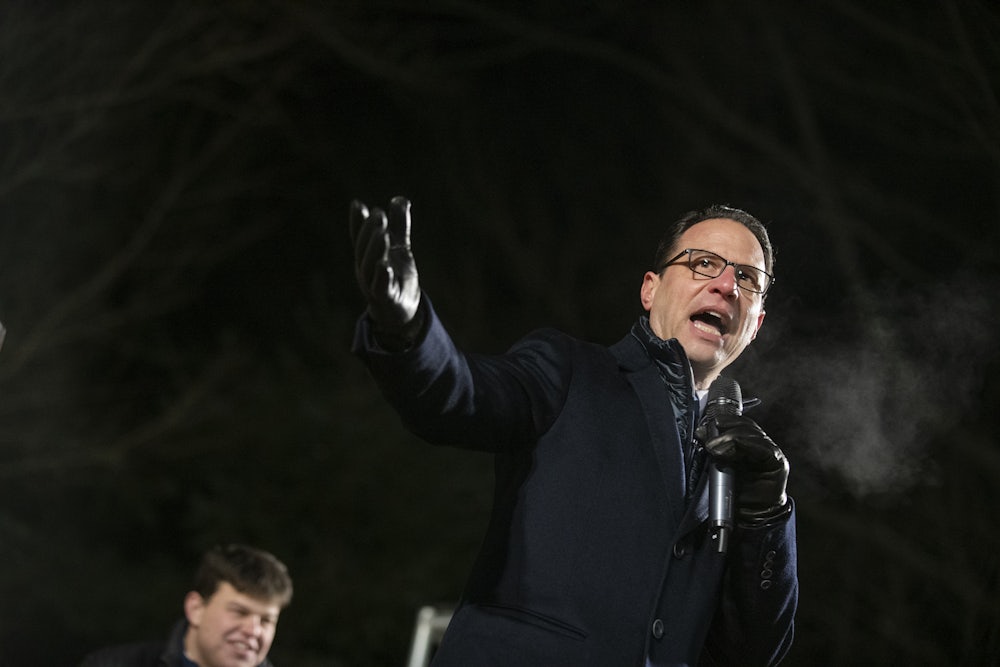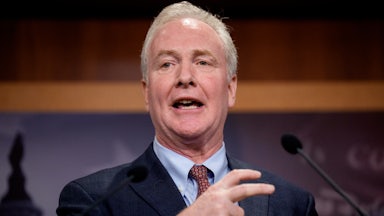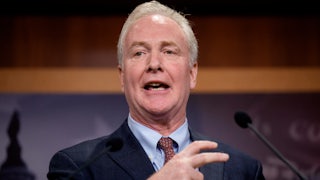In Pennsylvania, as anywhere else in America, private schools can do pretty much whatever they want. They can refuse to accept disabled or LGBTQ applicants. They can expel students for getting pregnant and even for merely having LGBTQ friends outside of school. At the same time, they can require applicants’ families to attend church, not to mention teach students that God created the universe in six days.
Some schools in the state do exactly that—with the support of nearly a half-billion dollars’ worth of public funds, and with hardly any state oversight. And yet, even some Democrats, including Governor Josh Shapiro, want to direct more taxpayer dollars—which otherwise would go to public schools—to private schools.
Pennsylvania has two programs that provide students with tuition vouchers for religious and secular private schools: the Educational Improvement Tax Credit, or EITC, and the Opportunity Scholarship Tax Credit, or OSTC, programs. But a new report from the Keystone Research Center has found that these schools have a troubling track record and glaring lack of accountability, allowing taxpayer dollars to subsidize wealthy families and fund expensive schools that teach creationism and discriminate against students.
While proponents of vouchers claim they give better educational opportunities to underserved students with low test scores, the report highlights just how little information exists to even assess these programs’ impact on student achievement. What is known, however, is that these programs now have a combined annual budget of $470 million—up from $340 million the previous year. In the 2022–2023 school year, $240 million went to religious schools and nearly $17 million went to the 24 most exclusive, most expensive schools in the state, where the average tuition is about $41,000 a year.
“What we really found is that these voucher programs that already exist in Pennsylvania are exclusive,” Diana Polson, the Keystone Research Center’s senior policy analyst and co-author of the report, told me. “If you look at the average EITC and OSTC scholarship, it’s usually around $2,000 a year. That would barely make a dent in any of these schools.”
While the income limit for scholarships is nearly $150,000 per four-person household, it is unlikely that low-income students make up the bulk of scholarship recipients. According to Susan Spicka, the executive director of Education Voters of PA, there is no auditing or reporting being done that would indicate this family income limit is being checked by private schools, let alone enforced. “There really is no safeguard against very, very wealthy families being able to tap into this money,” Spicka told me, adding there is “real resistance” in the state legislature to change this.
The Keystone report also cites Spicka’s research showing that 100 percent of OSTC-recipient schools have policies in place that allow students to be discriminated against on the basis of sexual orientation, gender identity, disability, religion, pregnancy or abortion, academic performance, or “right fit.”
Since private schools are exempt from nondiscrimination laws, they can expel or refuse to admit any student for any reason, even if the school is receiving public funds through the voucher programs. At some schools, students’ families are required to go to church before enrolling or have a pastor reference, she said, and in others, “you can’t be even friends with kids who are in the LGBTQ+ community and be enrolled in the school.”
At Providence Christian School in Chambersburg, the student application states that the school reserves the right “to refuse admission of an applicant or to discontinue enrollment of a student” for “living in, condoning, or supporting sexual immorality; homosexual acts or sexual orientation; promoting such practices; or otherwise the inability to support the moral principles of the school.”
Some schools violate students’ privacy by requiring them to report their pregnancies to the administration and attend Christian pregnancy counseling. At Clearfield Christian School, students who become pregnant or have a child will be expelled immediately with the option to appeal. “Any student who becomes pregnant or fathers a child must report this information to the administration as soon as possible. A student will not be considered for readmission until a full semester after the birth of the baby,” the policy reads.
Many schools also discriminate against students with disabilities and learning disorders by refusing to accept them or screening them out. St. Stephen’s Episcopal School in Harrisburg requires admissions testing, stating that “all admissions are offered on a 30 day probationary period to determine if the school can meet the academic, social and emotional needs of the student.”
“These just don’t seem to be the values that we would want to be funding with tax dollars in Pennsylvania,” Spicka said.
The Keystone report also found that there is very little accountability in the teaching of creationism and “biblical worldview education” in religious private schools that receive vouchers. Rachel Tabachnick, an independent researcher and co-author of the report, told The New Republic that less expensive religious schools often cut costs by implementing education curricula from Abeka Book and BJU Press, which offer biblically based education materials that align with their religious beliefs. “This is a type of curricula that would not pass state standards,” Tabachnick said.
Since the schools are not subject to such standards, however, it is entirely up to them to decide what to teach in each subject; they’re only required to report the number of hours these subjects are taught. “There is no oversight of what text they’re using, of how it’s taught, of who’s teaching it, and so you have a lot of the kind of examples that we included in the report, including entire curricula series that are based on young earth creationism,” she said. (Young earth creationism is the belief that the earth is only a few thousand years old and that the universe was directly created by God in six literal days.)
The Keystone report notes that both conservative religious leaders and libertarian thinkers have long been pushing for the privatization of schools and have been promoting school vouchers as a way to help achieve that, which helps explain the blatant lack of accountability.
“The conditions that these religious schools put forward for participating is that there not be accountability because they don’t want to change the nature of their school,” Tabachnick said. And Polson noted to me that in 2005, the state “actually passed a law that prohibits the Department of Community and Economic Development from gathering any more information from scholarship organizations.”
Pennsylvania’s public schools are currently underfunded by $6.2 billion and have a massive funding gap of $5.4 billion between wealthy and low-income school districts. The state, despite ranking in the top 25 for education overall, also has pretty wide opportunity achievement gaps based on race and socioeconomic status. Education advocates have long claimed that adequate and equitable funding for all public school districts would be instrumental in helping to close this gap, and Commonwealth Court Judge Renée Cohn Jubelirer agreed, ruling in February 2023 that the state’s school funding system is unconstitutional. “Students who reside in school districts with low property values and incomes,” Jubelirer wrote, “are deprived of the same opportunities and resources as students who reside in school districts with high property values and incomes.” She also declared that it’s the state government’s responsibility to come up with a plan to address these deficiencies.
Since the ruling, Governor Shapiro has proposed a $1.1 billion increase in public school funding, which would certainly help address the problems with the state’s school funding system. According to Education Secretary Khalid Mumin, however, there is apparently no “guarantee” that this money will only go to public schools. Meanwhile, Republican lawmakers and even Shapiro also pushed for a new voucher program that would pour an additional $100 million in taxpayer money into private schools and away from chronically underfunded public schools. The plan was eventually abandoned, but Mumin recently said it’s still on the table for the 2024–2025 budget. And, as noted above, the legislature added $130 million to the two existing voucher programs, a 38 percent increase in their combined budgets.
“For every dollar that we invest in private school vouchers, whether that be our existing programs or new ones, that’s a dollar not being spent on adequately funding our public schools,” Polson said. “Our number one priority needs to be adequately and equitably funding our public schools.”






